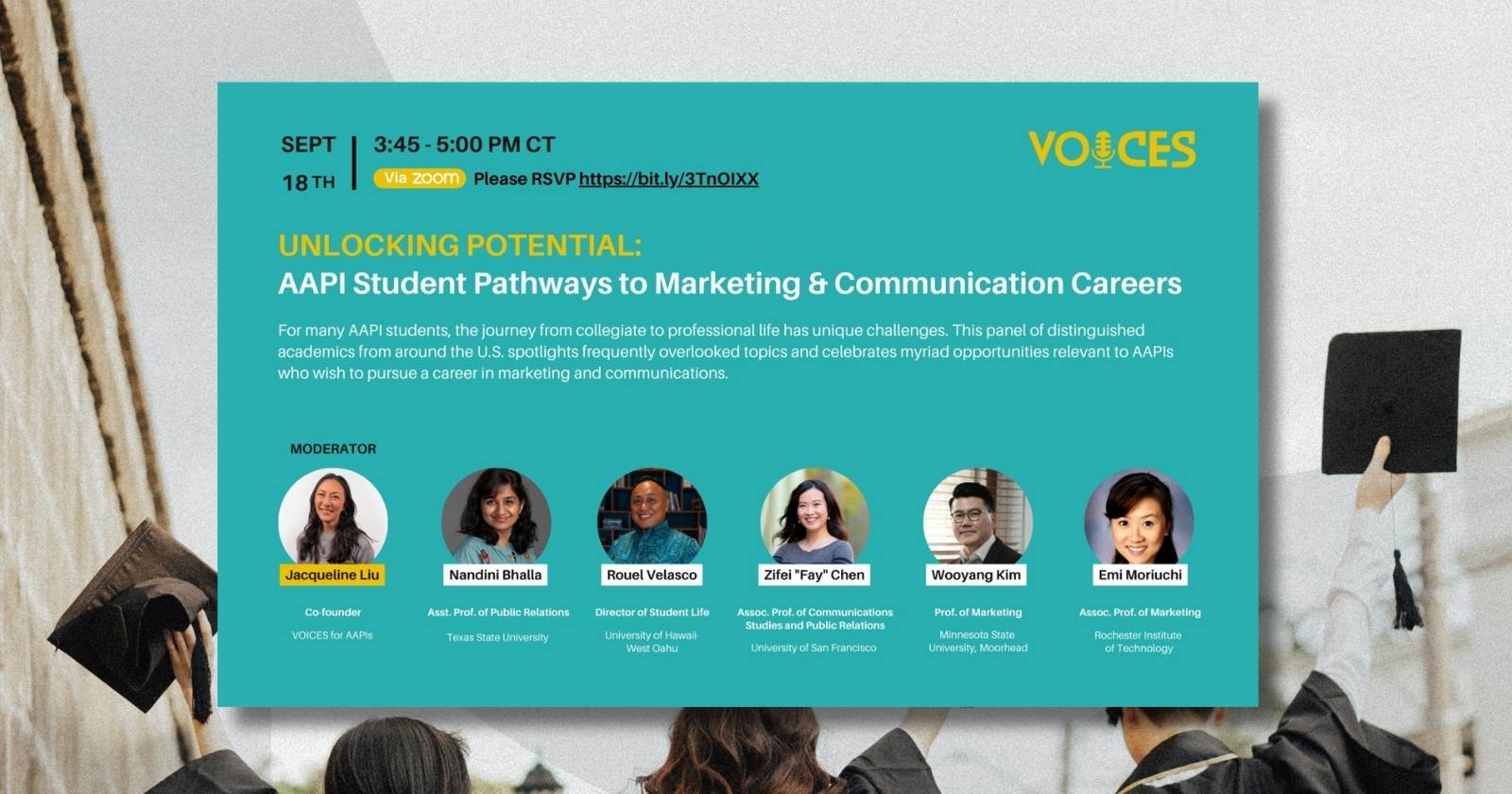By Jahnavi Srinivas
As a South Asian student pursuing my interests in human behavior, marketing, and public relations, I often feel like I’m swimming against a tide. Surrounded by pre-health students at UCLA and a family of physicians at home, it’s a miracle that I haven’t succumbed to STEM. On top of juggling familial pressures, cultural expectations, and societal stereotypes, a lack of South Asian representation in communications makes envisioning a career in it even more abstract for myself.
While my perspective may be uncommon, it is certainly not unique. Integrating one’s cultural identity with professional pursuits can be burdensome, especially when they don’t meet certain standards. Though AAPI representation and allyship have received increasing recognition, navigating these challenges without a foundation or support system can be a daunting process for students (like myself) who will soon enter the workforce.
VOICES for AAPI, an organization dedicated to promoting AAPI professionals in communications roles, hosted a panel to inspire students and affirm their culturally specific experiences. The virtual event was moderated by Jacqueline Liu, co-founder of VOICES, senior vice president of The Pollack Group, and adjunct professor at University of Southern California. The panel consisted of distinguished academics, including Dr. Nandini Bhalla, assistant professor of public relations at Texas State University; Dr. Rouel Velasco, director of student life at University of Hawaii – West Oahu; Dr. Zifei “Fay” Chen, associate professor of communications studies and public relations at University of San Francisco; Dr. Wooyang Kim, professor of marketing at Minnesota State University, Moorhead; and Dr. Emi Moriuchi, associate professor of marketing at Rochester Institute of Technology.
Bearing AAPI history, culture, and beliefs in mind, panelists advised students to communicate transparently, embrace their full potential, network effectively, and secure work experience to achieve their professional goals in marketing and communications.
Developing Your Voice
While self-promotion can be uncomfortable, it’s ultimately needed to get your name and efforts noticed. “If you don’t talk about your work, nobody else will,” said Bhalla.
Speaking openly and honestly is key to being recognized in the workplace. “We have to talk about ourselves, communicate that, and express things that historically have been passed down,” said Velasco.
My takeaway is that feeling empowered as an AAPI student begins with sharing your personal journey. Acknowledge your strength for transcending boundaries and redefining cultural norms, which will encourage you to continue speaking up.
Believing in Yourself
Being confident and recognizing your own value will go a long way in your academic, personal, and professional journey. “Change your mindset and turn a perceived disadvantage into your strength,” said Chen.
A psychological phenomenon that many AAPIs are familiar with is imposter syndrome, as academic rigor, career-driven ambition, and perfectionism are rooted within their cultures. Combined with the need to exceed parental expectations, it is no surprise that self-doubt and inadequacy often seep into the spirit of AAPIs.
“When we talk about imposter syndrome, we typically think it’s other people overestimating us. But it’s really underestimating ourselves,” said Chen. “Lean into the great hidden potential you have.”
“Before joining a job, do some inner work,” suggested Bhalla. “Ask yourself: what are your strengths and weaknesses?” Instead of chasing external validation, having faith in yourself and your talents will keep you determined and motivated as a young professional.
Cultivating a Strong Network
To launch a career in marketing and communications, panelists emphasized the value of establishing interpersonal connections with faculty and finding a mentor for guidance.
“I want to see your passion, and I’m willing to help you become better,” said Kim, highlighting his perspective as a professor.
“A mentor always wants a mentee, and a mentee also wants a mentor,” seconded Bhalla. “It’s a two-way relationship. When we tell someone to do something, we feel valued. Help me, and I think it’s gonna help you as well. A genuine attitude and connection with people goes a long way.”
Finding a mentor who is right for you means forming a sincere relationship. “Regardless of where you grew up or how you learned to be a polite person, the most important thing is to click with that person and their personality,” said Moriuchi.
Students will thrive in environments which allow them to embrace their identity and be themselves unapologetically. “Have a village that will continue to support you,” said Velasco. “Who is your personal board of directors? Just find one person who can help you build those connections.”
Another route to resources and connections for AAPI students is through campus organizations. “Talk to people who share common identities and struggles. Learn from alumni and their experiences,” said Chen.
The International AAPI Experience
Because strong verbal and written skills are critical for success in the world of communications, a common misconception is that students of international backgrounds are unfit for these careers. However, the panel clarified that this field does not have to be off-limits for students facing linguistic barriers.
“Let the work speak for itself,” insisted Moriuchi. “Accent or not, people will recognize your intelligence based on the quality of your work. And, an accent means you can speak another language, proving you really are smart!”
Like any other professional field, internships and jobs are crucial for growing one’s skills and advancing in the communications and marketing world. However, many international AAPI students may face difficulties in getting a work permit in the United States.
“Approach the marketing department at school,” suggested Kim as an alternative. Each university is responsible for maintaining their brand and reputation, so they may find it helpful to hire an international student for their global perspective.
If obtaining a work permit is not feasible, Bhalla suggested that students seek volunteer opportunities in their communities. Many marketing, PR, and advertising firms also have offices abroad, which may be a more viable option for some international students looking to gain hands-on experience.
The Way Forward
While transitioning out of collegiate life and into the working world proposes a set of unique challenges for AAPI students, panelists illustrated tangible ways to build a successful career in communications and marketing. In the face of adversity, as minorities, it is important for students to channel resilience and stay true to their character. Above all, “nothing can beat hard work and perseverance,” stated Bhalla. “Keep doing the work, and it will shine.”






